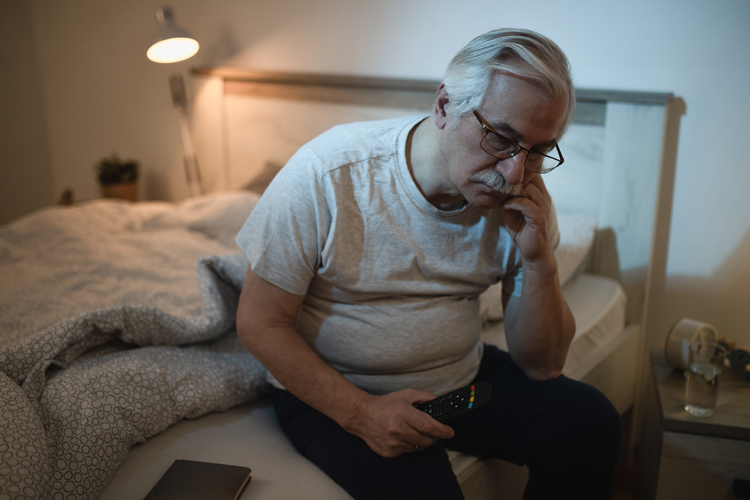As you age, you may experience changes in the sleeping pattern such as getting less deep sleep or becoming sleepier before the usual bedtime. Disturbance in sleeping patterns can tire you out and may lead to insomnia, which shouldn’t be considered “normal” or a part of aging.
As per studies , 40-50% of adults over 60 years experience insomnia, a common sleep disorder. Physical weakness, along with stress can cause sleep deprivation in older adults.
You may have noticed an elderly person taking sleeping pills before their bedtime, which certainly shouldn’t be a part of their daily routine. There are several natural ways, like embracing a latex mattress topper , following a consistent routine, and exercising, etc that can aid in getting plenty of sleep every night and waking up refreshed and energized. Let’s dive into the details to find out the ways of attaining uninterrupted sleep for older adults.
How Can Older Adults Improve Their Sleep Quality?
Below are seven easy and natural ways that can help older adults achieve better sleep.
1. Sleeping on a Comfortable Surface
Your sleep surface defines your sleep quality. Over time, ordinary mattresses become stiff and uncomfortable to sleep on. You might keep tossing and turning the whole night, disturbing your sleep quality.
Replacing a mattress can be expensive. However, one can place a latex mattress topper to eliminate the stiffness from their sleeping surface. After all, when the surface is comfortable, it helps you achieve cozy and deep sleep.
2. Developing a Consistent Sleep Routine
Maintaining a consistent sleep schedule is important for getting better quality sleep. You should try repeating the same activities every day, like taking a hot shower, meditating, or reading before hitting the bed. It makes your brain consider those activities a precursor to sleep.
Additionally, constant anxious thoughts during bedtime can stimulate the mind and nervous system and develop symptoms of insomnia in seniors. However, following a consistent sleep schedule and deviating your mind can help you shift from unpleasant thoughts and ultimately sleep well.
3. Identifying Underlying Health Issues
Problems like cardiovascular diseases, neurological disorders, or respiratory issues can wake you in between your sleep. A weaker immune system develops numerous health problems. Weak muscle and body pain are the most common health issues in senior citizens. Many elderly people prefer sleeping on a latex mattress topper since it helps them relieve muscle aches with its ideal firmness.
If you identify your medical condition hindering your sleep quality, you can take essential steps to treat it.
4. Ensuring Mental Well-being
Chronic illness and stress often cause insomnia and daytime drowsiness in older adults. Elderly women tend to experience insomnia more than elderly men.
Dealing with stress can result in disturbed sleep. The accumulation of stress hormones in the brain can make it more difficult to fall asleep. Over time, it can affect one’s cognitive functions.
You can avoid the thoughts and factors that cause you stress or mental pressure by reading a book, practicing mindfulness meditation, or listening to some peaceful music. When the stress hormone reduces, your mind calms down and keeps away unpleasant thoughts from disturbing you at night.
5. Practicing Exercise
Exercising not only improves your physical health but also your mental health. Practicing yoga can make your mind calm and help you fall asleep faster. Doing light exercise in the evening helps your body release sleep-producing hormones.
Also, a walk in the evening can help you sleep faster at night. Walking increases your body temperature, and it starts to fall after about 30-90 minutes. The decline in body temperature helps to facilitate sleepiness.
6. Avoiding Caffeine Before Bed
Health experts suggest avoiding caffeine drinks before going to bed. It can increase your sleep onset latency and make your sleep less satisfying by energizing your body. It can boost cognitive functions that may keep you awake for a longer time at night.
Hence, avoiding such a stimulant that excites your central nervous system must be good to sleep better at night.
7. Avoiding Electronic Gadgets at Bedtime
Looking at an electronic screen at bedtime can reduce the secretion of melatonin, a sleep-producing hormone. Insufficient melatonin secretion makes one fall asleep late at night. Also, watching movies, web series, or news before bed can excite your mind. To make your mind calm and ready to rest, it is better to put away electronic devices before going to bed.
The Conclusion
Health is the most vital asset of humans, and sleep has a great influence on it. Peace of mind is an important factor for a good night’s sleep. Like a latex mattress topper comforts your body, exercise and meditation ease your mind. The above-mentioned ways can help senior adults achieve deeper sleep without taking any sleep-promoting drugs.
We hope that these seven sleep tips will help you with fruitful results. In case you’re experiencing severe sleep problems, consider consulting a physician immediately.





